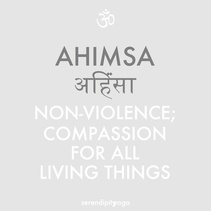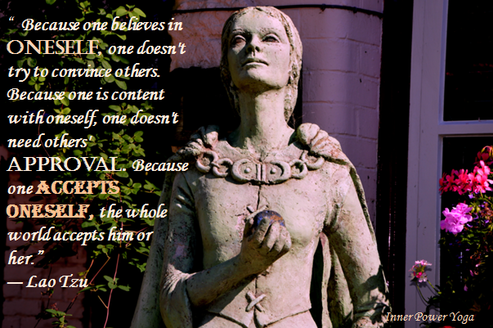 I have been dealing with the concept of self-acceptance for a while now. Sometimes we take for granted the fact that we accept who we are! It may sound crazy to think we do not; however, if we take a deeper look at our thoughts and behaviors, we may be surprised at how many times we just don’t like how we are, what we've done, or what we can do. We may force ourselves to “change” to suit other people’s needs, requests or desires. But at the end of the day, if we do not practice self-acceptance, how can we expect to be powerful? So frequently I see students look at the yogi next to them, and compare themselves with someone else. In my personal journey with self-acceptance I am trying to overcome this temptation through yoga. Here is how: 1. I accept my body and my flexibility - How easy is to compare myself with other beautiful Yogis who “seem” to be blessed with more flexibility than me, or with slender bodies, or those who seem to do complex poses easily… the list goes on and on… every time I experience a negative emotion associated to comparing myself to others, rating myself as better or worse than other yogis, I now become aware of it… and observe it. I don’t reject it, I just observe it. As a yoga teacher there is an expectation that we'll be tip top when teaching. I find however, it is very liberating to be honest with my students, and on given days accept that my hamstrings are rather tight. I find students prefer to see an honest teacher! 2. Ahimsa – Yoga philosophy has a series of Yamas or attitudes/values we are advised to cultivate in our lives. One of them is Ahimsa, or the practice of compassion to all living things, and that includes self-compassion. So, next time I struggle to reach my toes in Uttanasana, or balance in tree pose, I coach myself not to self-talk negatively. I just take a deep breath and accept that yoga changes every day, sometimes we are great at it, and sometimes not. This is just what it is, no need to use force. 3. Self – Awareness. I seek to become aware, or notice feelings, thoughts and judgments in my yoga practice, and in my life! And I learnt from a Buddhist practice to not reject what I am aware of, just welcome it. 4. Gratitude –at the end of Savasana, I express gratitude for yoga and the class. There is so much to be thankful for, but I have become aware that I have not acknowledged it often enough. But I don’t do diaries as some people/gurus suggest; I just go and think about the things I feel grateful for. I am no expert on this, and my intention is simply to share my experience as yoga practitioner and teacher.
If you found anything resonated with you, then please feel free to share. Thank you for reading Namaste Lourdes
2 Comments
|
LourdesYoga teacher & Senior Scientist working full time with a major Multinational. Archives
December 2019
Categories
All
|


 RSS Feed
RSS Feed
